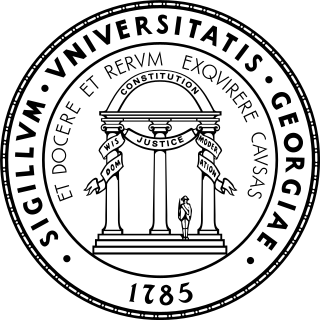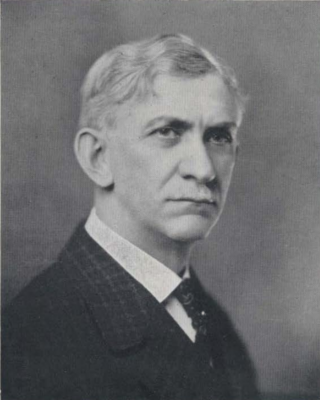
The University of Georgia is a public land-grant research university with its main campus in Athens, Georgia, United States. Chartered in 1785, it is one of the oldest public universities in the United States. It is the flagship school of the University System of Georgia.

The University System of Georgia (USG) is the government agency that includes 26 public institutions of higher learning in the U.S. state of Georgia. The system is governed by the Georgia Board of Regents. It sets goals and dictates general policy to educational institutions as well as administering the Public Library Service of the state which includes 58 public library systems. The USG also dispenses public funds to the institutions but not the lottery-funded HOPE Scholarship. The USG is the sixth largest university system in the United States by total student enrollment, with 344,392 students in 26 public institutions as of 2023. USG institutions are divided into four categories: research universities, regional comprehensive universities, state universities, and state colleges.

Dooley Field at Sanford Stadium is the on-campus playing venue for football at the University of Georgia in Athens, Georgia, United States. The 93,033-seat stadium is the ninth-largest football stadium in the NCAA, and the 17th-largest such stadium in the world. Games played there are said to be played "between the hedges" due to the field being surrounded by privet hedges, which have been a part of the design of the stadium since it opened in 1929. The current generation of hedges were planted in 2023 after the originals were taken out to accommodate the football tournaments for the 1996 Summer Olympics. The stadium is often considered one of college football's "best, loudest, and most intimidating atmospheres".

Vincent Joseph Dooley was an American college football coach. He was the head coach of the Georgia Bulldogs from 1964 to 1988, as well as the University of Georgia's (UGA) athletic director from 1979 to 2004. During his 25-year head coaching career, Dooley compiled a 201–77–10 record. His teams won six Southeastern Conference (SEC) titles and the 1980 national championship. After the 1980 season, Dooley was recognized as college football's "Coach of the Year" by several organizations.

The Georgia Bulldogs football program represents the University of Georgia in the sport of American football. The Bulldogs compete in the Football Bowl Subdivision (FBS) of the National Collegiate Athletic Association (NCAA) and the Southeastern Conference (SEC). They play their home games at historic Sanford Stadium on the university's Athens, Georgia, campus.

The Georgia Bulldogs are the intercollegiate athletic teams that represent the University of Georgia. The Bulldogs compete in NCAA Division I and are members of the Southeastern Conference (SEC). The official mascot is an English Bulldog named Uga,, while the costumed character version of Uga is Hairy Dawg. Most of the school's athletic teams are known as the Bulldogs, with the exception of the women's basketball team, known as the "Lady Bulldogs", and the women's gymnastics team, known as the "GymDogs".

John Allen Roush is an American former academic administrator who was the 20th president of Centre College from 1998 to 2020. A graduate of Ohio University, Roush earned graduate degrees and began his career at Miami University, where he became executive assistant to the president in 1976. He departed to the University of Richmond in 1982, where he spent six years in administration before being elected to Centre's presidency. During his 22-year term, Centre established four student scholarship programs, nearly doubled the size of its faculty, led several successful fundraising campaigns, and renovated numerous academic, athletic, and residential buildings on campus. He announced his resignation in May 2019, effective June 2020, and was succeeded by Milton C. Moreland upon leaving office. Since that time, he has maintained his position on the University of Richmond board of trustees, received two honorary degrees, and spoken at Wofford College during its opening convocation in September 2021. In May 2021, Centre's Campus Center was renamed the Roush Campus Center, in honor of Roush and his wife, Susie.

Thomas Arthur Spragens was an American administrator who was the 17th president of Centre College in Danville, Kentucky. A graduate of the University of Kentucky, Spragens worked for the state and federal government early in his career, before joining the staff at Stanford University as a presidential advisor. He was the president of Stephens College in Columbia, Missouri, for a five-year term, and left Stephens to go to Centre in 1957.
Steadman Vincent Sanford was President of the University of Georgia (UGA) in Athens from 1932 until 1935. He subsequently served as Chancellor of the University System of Georgia from 1935 until 1945.
Frederick Corbet "Fred" Davison was the President of the University of Georgia (UGA) in Athens. He served in that capacity from 1967 until his resignation in 1986.

Charles Boynton Knapp was the president of the University of Georgia (UGA) in Athens, Georgia, United States. He served in that capacity from 1987 until his resignation in 1997.

Clean, Old-Fashioned Hate is the name given to the Georgia–Georgia Tech football rivalry. It is an American college football rivalry between the Georgia Bulldogs and Georgia Tech Yellow Jackets. The two Southern universities are located in the U.S. state of Georgia and are separated by 70 miles (110 km). They have been heated rivals since 1893.
Herman James Stegeman was a player and coach of American football, basketball, baseball, and track and field athletics, and a college athletics administrator. He served as the head football coach at Beloit College (1915), Monmouth College (1916–1917), and the University of Georgia (1920–1922), compiling a career college football coaching record of 29–17–6. At Georgia, Stegeman was also the head basketball coach (1919–1931), head baseball coach (1919–1920), and head track and field coach (1920–1937).
Damon M. Evans is the athletics director/chief financial officer at the University of Maryland. Since October 2017, Evans has served as the interim athletic director at Maryland and in June 2018, was named the permanent athletic director.

Jere Wade Morehead is an American lawyer who is the 22nd president of the University of Georgia. He is also the Josiah Meigs Professor of Legal Studies at the University of Georgia's Terry College of Business, and was previously senior vice president for academic affairs and provost.
The Georgia Bulldogs football team represents the University of Georgia in American football.

William Clarke Young was an American minister, educator, and academic administrator who was the eighth president of Centre College in Danville, Kentucky, from 1888 until his death in 1896. The son of Centre's fourth president, John C. Young, William attended Centre and the Danville Theological Seminary, graduating in 1859 and 1865, respectively. He had a 23-year career in the ministry, serving congregations in Kentucky, Indiana, and Illinois, before returning to Centre to accept the presidency following the resignation of Ormond Beatty. During Young's eight-year presidency, the college established a law school, constructed numerous buildings, and retroactively conferred degrees upon some of its first female graduates. Young was also the moderator of the Presbyterian Church General Assembly in 1892, as his father had done some thirty-nine years earlier.

Richmond Ames Montgomery was an American pastor and academic administrator. Ordained as a Presbyterian minister in 1896 following his graduation from McCormick Theological Seminary, he held pastorates in Minnesota, Ohio, Iowa, and Missouri, before being elected president of Parsons College, a private liberal arts college in Fairfield, Iowa, in 1917. He spent five years at Parsons before resigning to accept the presidency of Centre College, another private liberal arts school, in Danville, Kentucky. He came to Centre in the midst of major popularity surrounding the school's football team, who had defeated Harvard in a major upset some months prior; this attention caused concern from some that the school was placing undue priority on football at the expense of academics. Montgomery aimed to change this and introduced measures to restore Centre's emphasis on academics, though these changes were unpopular with students, who signed a petition to remove him from office. As a result, he resigned in June 1926. Afterward, he was president of Lane Theological Seminary and held a faculty position at McCormick in his later career.

Robert Lee McLeod Jr. was an American pastor and academic administrator. Following his graduation from Louisville Presbyterian Theological Seminary, McLeod took preaching positions in Mississippi and Florida before spending two years working at the Presbyterian Church headquarters in New York. He was elected president of Centre College in Danville, Kentucky, in 1938 and took office in October of that year. After four years in the position, he was granted a leave of absence from Centre to serve in the United States Navy as a chaplain; in this job he spent two years as the theological director of the V-12 Program and one year aboard the USS Antietam, all while maintaining his title of president. During his absence, Centre hired Robert J. McMullen to be "co-president" alongside McLeod, living on campus and holding the full responsibilities of the position. McLeod resigned following the end of World War II and spent time preaching in Missouri, Florida, Tennessee, and Louisiana, before retiring in 1981.














